The great Bard once penned:
All: God save your majesty!
Cade: I thank you, good people—there shall be no money; all shall eat and drink on my score, and I will apparel them all in one livery, that they may agree like brothers, and worship me their lord.
Dick: The first thing we do, let’s kill all the lawyers.
Cade: Nay, that I mean to do.
Henry The Sixth, Part 2 Act 4, scene 2, 71–78
Shakespeare’s character Dick the Butcher’s idea of a perfect society was one where justice prevailed because there were no lawyers. The traitorous Jack Cade had not so noble a reason for wanting to get rid of all of the lawyers. He wanted to become the autocrat in a quasi-communistic social revolution. Cade alleges that all lawyers do is use laws and language set up by fellow lawyers to oppress and ruin the life of every day man. Therefore, in his estimation, no justice results.
That is an extreme view.
I suggest that perhaps justice best results when we have an educated and organized defense bar who is scientifically educated in forensic science. As I have blogged before, the forensic science community as currently practiced in the United States today is very flawed. Extremely flawed. Fundamentally flawed. In some cases, if not the majority of cases, it is utterly unscientific. I agree with the sentiments that the criminal defense community shares a large portion of the blame. Many lawyers well before our times, let come into evidence practices, techniques, and “theories” that had just but the very veneer of science and were, however, anything but scientific and far from valid. This institutional propagation of error is a large hurdle for many of us to overcome now where business as usual or simple repetition is somehow equated with validity.
So what are we to do?
Set up programs where we educate the defense bar.
I would like to highlight one of these: The American Chemical Society Hands-on Forensic Chromatography course.
It is a five-days hands-on class conducted at Axion Analytical Laboratories, Inc. in Chicago, Illinois. This hands-on course is taught by three icons of chromatography (Dr. Harold McNair, PhD, Dr. Lee Polite, PhD and Mr. Lew Fox) and two attorneys who specialize in evaluating chromatography and forensic science related cases (Justin J. McShane and Josh D. Lee).
The agenda includes:
Day 1
| 8:15am | Registration and Snacks |
| 8:30am | Introduction to Gas Chromatography |
| 9:30am | Inlet Systems for Liquid Injections |
| 10:30am | Lab 1: GC Familiarization and Parameters |
| 11:45 | Lab Review |
| 12:00pm | Lunch |
| 1:00pm | Fundamentals of Separation – Resolution |
| 2:30pm | GC Theory |
| 3:30pm | Capillary Columns |
| 4:30pm | Lab 2: Column Installation |
| 6:00pm | End of Session |
| 7:30pm | Group Dinner |
Day 2
| 8:30am | Quantitative Analysis |
| 9:30am | Discussion of QC in the Forensic World |
| 10:30am | Lab 3: GC Quantitation |
| 12:00pm | Lunch |
| 1:00pm | Lab Review |
| 2:00pm | Headspace GC |
| 4:00pm | Lab 4: Headspace Demo |
| 5:00pm | End of Session |
| 6:30pm | Axion Labs sponsored Group Dinner |
Day 3
| 8:30am | GC-MS Theory |
| 10:30am | LC-MS Theory |
| 12:00pm | Lunch |
| 1:00pm | Labs 5-7: Wet Lab –Sample Preparation/ Integration / GC-MS Instrumentation |
| 3:00pm | FID Detector |
| 4:00pm | Discovery |
| 5:30pm | End of Session |
| 7:05pm | Sporting event |
Day 4
| 8:30am | Ethics |
| 9:30am | Lab 8: Walking Down a Case-How to Sort, Identify and Examine Data (Confrontation Clause) |
| 11:00 am | General Review of Major Concepts |
| 12:00pm | Lunch |
| 1:00pm | Defenses That Work |
| 3:00pm | Lab 9: Troubleshooting GC Problems |
| 4:30pm | Lab 10: Beers and Data Roundtable (Bring your own data set evaluate with your small group) |
| 8:30pm | End |
Day 5
| 8:30am | Troubleshooting Lab Review |
| 9:00am | Cross examination of an Analyst |
| 10:30am | Direct Examination of an Expert |
| 12:00pm | Trouble Shooting Lab Review |
| 12:30pm | Soft stop of the course with general discussion |
| 2:00pm | Hard Stop-End of Course |
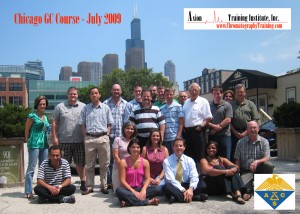
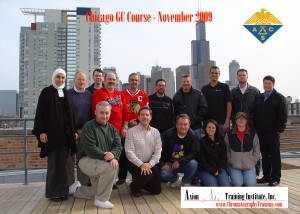
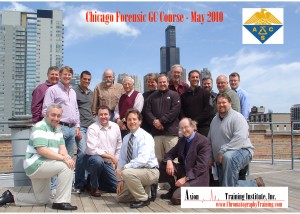
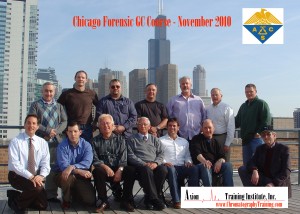
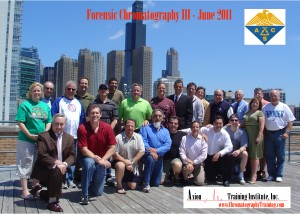
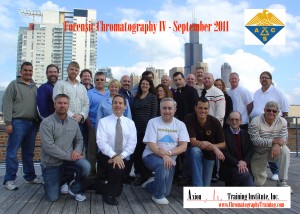
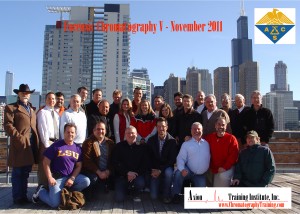
This class attracts full of attorneys from all across the United States. In this class attendees not only are instructed in the classroom theory that underlies chromatography (both liquid and gas chromatography) in general and the specific theories that allow for headspace analysis and how Flame Ionization Detector, UV-DAD and Mass Spectrometry (EI and EC based) works, and get to see the instruments, but they also get to do the following with their own two hands and more:
Hands-on Lab 1
Instrument Familiarization where the attendees preform direct injections into a Gas Chromatograph-Flame Ionization Detector (GC-FID) using EtOH samples, and learn to interpret GC-FID chromatograms, import and manipulate a method, change the different variables on the GC-FID and elucidate the results.
Hands-on Lab 2
The attendees on their own GC machine remove and install capillary columns and all of the components of the injector (septa, liner, gold seal, etc.), check for efficiencies, resolution, theoretical plates, and learn about split versus splitless injector settings.
Hands-on Lab 3
The attendees on their own GC machine establish a calibration curve from CRMs for EtOH. The attendees on their own GC machine analyze the response and program a calibration curve (external standard) and also use the Internal Standard method to assure quality. The attendees on their own GC machine establish methods and reporting of this crucial part of testing.
Hands-on Lab 4
The attendees continue to use Headspace Gas Chromatograph-Flame Ionization Detector and also use Gas Chromatography Mass Spectrometry (GC-MS) system, and use an High Performance Liquid Chromatography (HPLC) system.
Hands-on Lab 5
Sample Preparation-sampling versus sample selection is demonstrated. The attendees do their own Pipetting. The attendees do their own control charting. The attendees use volumetric flasks. The attendees learn about pre-analysis error hands-on and how it affects quantification. The attendees are introduced to issues of metrology and Uncertainty Measurement.
Hands-on Lab 6
Integration. The attendees on their own ChemStation workstation learn about integration and how easy it is to manipulate the data. The attendees manipulate their own data. The attendees learn what to look for that shows that the data was manipulated, and the attendees learn how to manipulate data so that it is not discoverable without the raw computer data in the software files.
Hands-on Lab 7
GC-MS Instrumentation. The attendees see how easy life is for an analyst. The attendees get to see the analysis of the raw data on a GC-MS and discover how a true novice can turn into an “expert” with a simple push of a button. The attendees see with their own two eyes the “hidden” data that the Government and its laboratory doesn’t want anyone to see that will reveal the truth that the supposed “gold standard” that provides for the alleged “unequivocal identification” of testing of unknowns that is GC-MS is not perfect.
Hands-on Lab 8
How to Obtain Discovery/Walking Down a Case/Defenses that Win-Advanced Issue Spotting: In this lab, the best practices in how to obtain discovery with a special emphasis on how to strategically and practically build a record so that the attendees can get the raw data in its un-manipulated raw computer form and also in its print form. The attendees go through an actual case that was litigated that featured experts on both sides, and issue spot all of the problems with the discovery and the data as it was presented.
Hands-on Lab 9
Troubleshooting. The attendees on their own GC machine run an unknown sample which may result in some sort of “problem” in the chromatogram. The attendees issue spot the problem and rationalize what is wrong, and fix it.
Hands-on Lab 10
The attendees with their lab partners go over their own data set from real cases to figure out what is wrong with the attendees’ local laboratory.
Graduates of the group include:
| STATE | LAST NAME | FIRST NAME | STATE | LAST NAME | FIRST NAME | |
| Alaska | Slone | Fred | New Jersey | Hernandez | Steven | |
| Arizona | St. Louis | Joe | New Jersey | Levow | Evan | |
| California | Barba | Manny | New Mexico | Frechette | Roderick | |
| California | Brehmer | Jeremy | Oklahoma | Edge | Bruce | |
| California | Ganci | Eric | Oklahoma | Fabian | Stephen | |
| California | Gorelick | Lynn | Oklahoma | Hosty | Tom | |
| California | Laundry | Virginia | Oklahoma | Lee (x5) |
Josh D. | |
| California | Middlebrook | Richard | Oklahoma | Patterson | Clint | |
| California | Moore | Ron | Oklahoma | Sifers | Jeff | |
| California | Sturm | Craig | Oregon | Carini, Jr. | Peter | |
| California | Tiemann | Roland | Pennsylvania | Barrouk | Tim | |
| California | Wasson | James | Pennsylvania | Manchester | Brian | |
| California | Wapner | Terry | Pennsylvania | McShane (x6) |
Justin | |
| Colorado | Bussey | Tim | Pennsylvania | Sherman | Mike | |
| Colorado | Cessna | Christopher | Tennessee | Garza (x2) |
Marcos | |
| Colorado | Herringer | William | Tennessee | May | Roger | |
| Colorado | Savela | Jason | Tennessee | McKinney | Rob | |
| Colorado | Orr | Rhidian | Tennessee | Ryan | Edward | |
| Florida | Kessler | Mike | Texas | Balagia | Jaime | |
| Florida | McIntosh | Brett | Texas | Butler | Jim | |
| Georgia | Adams | Clark | Texas | Boatwright | Nicky | |
| Georgia | Babson | Rocky | Texas | Case | Kelly | |
| Georgia | Caron | Brian | Texas | Coffey | Mimi | |
| Georgia | Frye | Kim | Texas | de la Paz | Brent | |
| Georgia | Parman | Ann | Texas | del Cueto | Andrew | |
| Georgia | Stein | George | Texas | DeLuca | Matt | |
| Illinois | Ramsell | Donald | Texas | Flood | Tyler | |
| Illinois | Toney | Sarah | Texas | Grant | Deandra | |
| Kansas | Hulnick | Les | Texas | Hamilton | Stephen | |
| Louisiana | Delatte (x2) |
Glynn | Texas | Hunter | David | |
| Louisiana | Bates, Jr. | James | Texas | McKinney | Troy | |
| Maryland | Alpert | Andrew | Texas | Murphy | Doug | |
| Maryland | Bruckheim | Michael | Texas | Ray | Bennie | |
| Maryland | Stamm | Lenny | Texas | Segura | Anthony | |
| Massachusetts | Oberhauser | Gregory | Texas | Stauffer | Phil | |
| Michigan | Boyle | Michael | Texas | Trichter (x2) |
Gary | |
| Minnesota | Ramsay | Charles | Texas | Wilder | Douglas | |
| Missouri | Eastman | Jeffrey | Utah | Schatz | Jason | |
| Missouri | Hollingshead | Jeremy | Virginia | Keefer | Bob | |
| Missouri | Ward | Carl | Virginia | Solak- (x2) |
Michael | |
| Nebraska | Dowding | Steve | Washington | Callahan | Linda | |
| Nebraska | Island | Bell | Washington | DeBray | Ted | |
| Nevada | Hayes | Dale | West Virginia | Wagner | Harley | |
| New Hampshire | Russman | Ryan | Wisconsin | Stuckert | Lauren | |
| New Hampshire | Tenn | John |
There have been 89 graduates to date.
The next class (which is full) will be in April is scheduled to have the following folks:
|
Patrick Maher |
MD |
|
Hunter Biederman |
TX |
|
Wayne R. Foote |
ME |
|
John Hunsucker |
OK |
|
Andrew Mishlove |
WI |
|
Michael J Snure |
FL |
|
Clark Adams (2nd time through) |
GA |
|
Andrew Bucher |
OH |
|
N. Cole Williams |
NC |
|
Jay M. Tiftickjian |
CO |
|
Bruce Edge (2nd time through) |
OK |
|
Brent de la Paz (2nd time through) |
TX |
|
Paul Liam McGlone |
VA |
|
Kevin Leckerman |
PA |
|
Jon W Woolsey |
CA |
|
Gordon Senerius |
SC |
|
Nico La Hood |
TX |
|
Bryan E DePowell |
PA |
|
Joseph Citron |
GA |
|
John j Eastland |
TX |
|
Jonathon Rands |
WA |
|
Shawn Dorward |
PA |
|
Jared Bartell |
CA |
To insure justice, we need to have an educated defense bar. We need more scientific programs like this one.



Rob McKinney says:
I am a proud graduate of this course. I read the post with the thought all those that take the time to attend are no longer the dump truck lawyer. Get the fee. Plead the case and move to the next case. Those that attend this course are the lawyers that will battle the state and hold the labs accountable. This course produces warriors.
Benton Baker IV says:
I am a Texas attorney interested in attending the Gas Chromatography course. Please forward me enrollment information. Thank You.
Sincerely,
Benton Baker IV